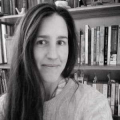You have no items in your cart. Want to get some nice things?
Go shopping
Back to the glass, I couldn’t see the real stars. Sporadically placed lighting produced chiaroscuro, made a complete picture difficult to piece together. Obscuring penumbra and dull lacunae created strobe lighting when I moved, as if the festival foyer had been hologram gift wrapped, and although I had my camera, I had not removed the lens cover, so that when the star pointed to me and said something that sounded in the slow-motion of my comprehension like “That’s the woman who’s fucking my husband”, I merely clicked.
Above us, the Cassini space probe was on her way to perform a flyby of Saturn’s moon Hyperion. At this moment, she was photographing Enceladus. A beauty by Western standards, Enceladus’ skin is pale, but the countenance is pocked and scarred with Labtayt Sulci, as though made-up with lead like a sixteenth century courtesan, before they worked out lead caused acne, madness, death. Acne was the least of a courtesan’s worries.
The star was performing a flyby of sorts. Leaning to the writer next to her, she drawled, “I know,” until she had acquired knowledge of everything I was wearing, from my expression to the tee-shirt I’d cadged off my daughter, down to the miniskirt, boots, before launching into meteoric laughter. Observing, I felt strangely detached from the spectacle of my body, but at the same time remarkably steady within it.
Scientist Isaac Newton demonstrated that the motion of celestial bodies and objects on earth can be described by the same natural laws. He also proved that for every force, there is an equal opposite force. I suspected the star wouldn’t have laughed if she’d known.
“Here’s your coat, mum.” For a thirteen-year-old, my daughter had impeccable timing.
The star caressed her chin like a pharaoh, called out,
“Enjoy your evening with my husband.”
The glass doors parted the way the Red Sea was said to have for Moses. Doing the equivalent of flipping the bird on behalf of the Israelites, I said,
“I will, thanks.”
The earth feels static to those upon it, when looking at the stars, like watching pictures of the moon and sun through a zoetrope. Only by closer observations can its subtle complexities be perceived. If I had been able to roll back the earth on its axis, could I have seen the star’s husband on a date, up the road? Cassini had already observed the transit of Venus across the sun. As was the case with Captain Cook, mapping Venus wasn’t the whole point of the excursion.
Outside, my daughter said,
“What just happened?”
When Cassini photographed earth, it was the first time that NASA informed the public in advance that a shot was being taken. NASA wanted the star and her lover to smile when they were passed over. Those watching from earth would have to wait until all the pictures came in before the extent of the mission could be fully appreciated.
What I knew in the moment was that I got shamed, like when my mother walked into my bedroom and opened the window, because in the ’80s, I was a feminist by another name. I knew how to feel shame and when to feel it. As a rapper slut-shamed a stripper by saying he needed thirty showers after being with her, it struck me how behaviour I experienced from men was worse in that moment because it was perpetrated by a woman; a woman with more social and economic status than me; a woman old enough to be my mother; a woman educated to know what all that means.
“Some stars think they’re gods.”
I had an affair with the star’s husband. She was having an affair with the husband of someone who didn’t know. Fortunately for the star, hypocrisy is no more a crime than promiscuity.
My daughter had slipped her hand like a cup around mine. Bored in the festival, she had drawn on hers. The ink reminded me of a bowl that archaeologists had found in Iran’s ancient Burning City, that, if spun, animated a depiction of a goat leaping to pluck the highest leaves from a tall shrub. Over and over, it would leap and snatch a leaf and the leaf would miraculously reappear, and the goat would never be full.
Months later, I would write,
“I named you after Minerva.”
“Goddess of wisdom and war and blah,” I would make my fictional daughter reply.
The Greek version is better. She got to throw Sicily at Enceladus. My daughter is staunch enough and it is me who feels the metaphorical satisfaction of hurling things into a volcano.
She gave my hand a squeeze. “Does she think the universe revolves around her?”
Fictional me would say, “As much as it amuses me to imagine the star as a ball of burning gas impaled on an axle, I know there is no specific location that is the centre of the universe.”
“Albert Einstein’s principle of relativity.”
My real daughter knows about physics too. “Goddess of schooling, ay?” But it will be many months more before I can write this.
A short time after I met the star’s husband, I took a visitor tramping. My daughter tagged along. After a couple of hours of trudging muddy, mostly uphill, tracks, the visitor’s pace got slower as they removed layer after layer of clothing before they snapped, “It’s difficult to tell which one of you is the parent.” The visitor returned home to their family for whom they had posted updates on social media.
I discovered my affair on social media. People stopped talking to me; a person stared through me when I said hullo despite having once spoken in such proximity that pieces of the canapé they were eating entered my mouth; and, in a cluster-fuck of societal propriety, a person told me they had only had three long-term relationships but some of their friends led very interesting lives, and I could be one of them.
My daughter said, “I’m not getting married.”
I hoped not, at thirteen. I wanted to go back, tell the star I wanted better for her, but wasn’t that just buying in to the idea that women can fix this for ourselves?
I looked up, but there was too much light pollution to see the actual stars. My daughter asked me some other questions that I rephrased as: Why don’t the men in this story talk?
Perhaps they do it where we can’t see them. Apparently, men are from Mars.
Mars and Enceladus are two of only a few places scientists think aliens exist, aside from earth. Alien means simple life forms, not men. There could be sluts on Saturn, for all we know. Scientists are always looking to other planets as possible hosts for future habitation. But the universe might once have been overrun with sluts who became extinct in the same way dinosaurs did on earth, wiped out by the effects of a single equalising event.
Dinosaurs may have had small brains, but some of earth’s most grandiose thinkers alive have big heads and, within, the word slut eccentrically orbiting their small minds.
Enceladus, so small and far from the sun, should be dead. Were it not for Enceladus’ eccentric orbit and the gravitational pull of Saturn, two counter forces working to vacillate its heart, the moon’s core would be as frozen as its shell: a mirror, sixty miles deep. But the glass, fractured, leaks ice that reacts with Saturn’s magnetic field and causes a plasma cloud of charged particles that in turn produce ultra-violet auroras. Look at me, Enceladus seems to say, as if constantly driven to prove its beauty in spite of certain peril to its admirers.
A homeless man was sitting outside the gelateria with a piece of card on his lap, scrawled with a message that was impossible to make out between the lights of the window display and the shadows they cast.
I wanted to tell my daughter, “I love you.”
When she was little, she would have asked, “More than the whole universe?” But at thirteen, her questions were no longer limited to those she knew the answers to, or her own best interests.
In the glow of a plush old theatre, two teenagers were holding hands, I guessed for the first time in public; the tall blonde smiling proudly, reassuring his shy black-haired boyfriend. Comparing my relationship, my expressions moved through those I used to draw on my daughter’s fingertips to depict emotions.
Was the star’s namesake taken by surprise when he kissed her? I imagined them, chins on interlocked hands, smiling at each other like a palindrome. A palindrome is a half-formed thing; must look in the mirror to feel complete; must take to fulfil itself.
When Cassini completes her comparison of Saturn’s other moons, the star will accuse me of stealing her husband while simultaneously saying the namesake got him first. I will remember to remove the lens cap, switch my camera to record, “People in glass houses should not throw stones.”
She will continue to take shots, laugh as she announces, “She’s insane”, in rooms packed with industry professionals who develop amnesia.
It took seven years for Cassini to enter Saturn’s orbit from her launch.
Cassini had been orbiting Saturn for ten years when she reported Enceladus was the likeliest location to host alien life.
Twenty years after launching, Cassini will enter Saturn’s atmosphere to disintegrate. Safe on Saturn, the fallout from her destruction cannot hinder future settlement on the moons considered hospitable.
While my daughter licked rings around her gelato, I thought about the space probe taking photos of Enceladus. In time, I will think about the namesake’s husband. Cuckolds are outmoded.
Later, I will see the star for what she really is, a four-letter word.
But I couldn’t see that from where I was. Even celestial bodies that could be viewed with the naked eye were obscured by the light of artificial stars that night. I looked at the auroras crowning the city. We could be anywhere.

About Rachel J Fenton
Rachel J Fenton is a working-class writer living in Aotearoa New Zealand. Her work won the University of Plymouth Short Fiction Prize, the Auckland University of Technology Creative Writing Prize, came second in the Dundee International Book Prize, and was shortlisted for the Royal Society of New Zealand Manhire Prize for Science Writing and other prizes. Twice nominated for the Pushcart Prize, she is currently nominated for the Best Small Fictions 2020. Also known as Rae Joyce, she was awarded a Creative New Zealand arts grant to research, draw and write a graphic biography of Mary Taylor, Charlotte Brontë's best friend.
- Web |
- More Posts(1)



